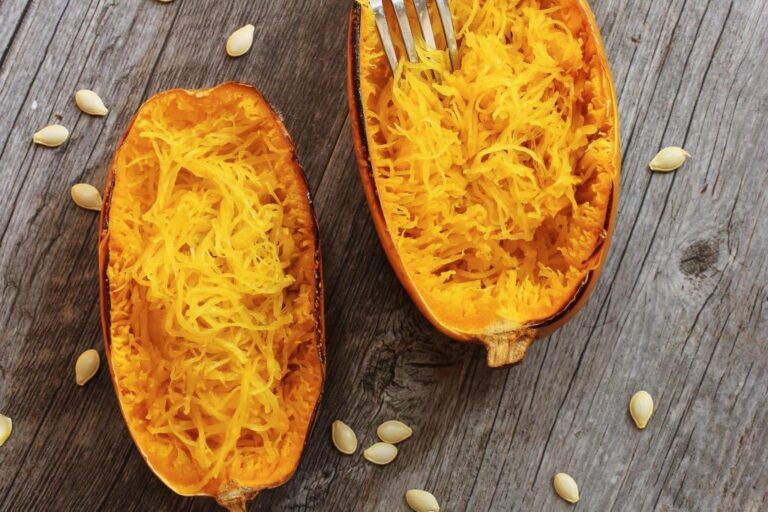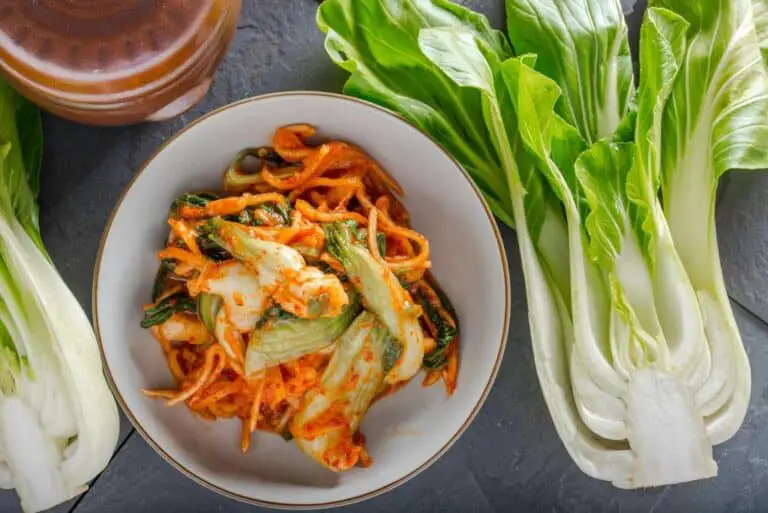What To Eat Kimchi With Vegan? Is Kimchi Suitable for Vegans?

Are you a vegan looking for ways to enjoy the tangy and spicy goodness of kimchi? Or are you wondering if kimchi, a traditional Korean dish made with fermented vegetables, is vegan-friendly? You’ve come to the right place!
Kimchi is a traditional Korean dish that has gained worldwide popularity due to its unique and delicious taste. Made from fermented vegetables, such as cabbage or radish, kimchi is known for its pungent, spicy, and tangy flavor. It is a versatile dish that can be eaten on its own, as a side dish, or as an ingredient in various dishes.
In this article, we’ll explore the world of vegan kimchi, from its ingredients and nutritional value to the best dishes to pair it with. Whether you’re a seasoned kimchi lover or a curious newbie, get ready to discover the many ways you can enjoy this delicious and healthy dish without compromising your plant-based lifestyle.
Is Kimchi Suitable for Vegans?
The main ingredients of kimchi are vegetables, spices, and seasoning. Vegetables used in kimchi can include cabbage, radish, scallions, and carrots. The spices used in kimchi are typically garlic, ginger, and chili pepper. The seasoning used in kimchi is fish sauce, which is not vegan-friendly.
However, there are vegan alternatives to fish sauce that can be used to make vegan kimchi. Some recipes suggest using soy sauce, miso paste, or mushroom sauce as a substitute for fish sauce. These alternatives can provide a similar depth of flavor to traditional fish sauce without compromising the vegan-friendliness of kimchi.
It is worth noting that some commercial brands of kimchi may contain fish sauce or other non-vegan ingredients. Before buying kimchi from the store, it is very important to carefully read the labels. You could also make vegan kimchi at home, making sure that all of the ingredients are vegan-friendly.
What To Eat Kimchi With Vegan?
Kimchi is a versatile dish that can be eaten on its own or paired with various foods. Here are some ideas on what to eat kimchi with when following a vegan diet:
1. Rice
Kimchi and rice are a classic Korean combination that is perfect for vegans. Simply cook a bowl of rice and add some kimchi on top for a flavorful and satisfying meal. You can also add some vegetables, such as steamed broccoli or sautéed mushrooms, to make the dish more nutritious.
2. Noodles
Kimchi can also be added to noodle dishes for a spicy kick. Try adding some kimchi to stir-fried noodles or noodle soup for a flavorful and satisfying meal. Rice noodles or soba noodles are good options for a vegan-friendly dish.
3. Sandwiches and Wraps
Kimchi can be a great addition to sandwiches and wraps, providing a flavorful and healthy twist to traditional recipes. Add some kimchi to a vegan burger or wrap for an extra layer of flavor and texture. You can also try making a kimchi grilled cheese sandwich for a delicious and unique meal.
4. Tacos and Quesadillas
Kimchi can be used as a topping for tacos and quesadillas, adding a spicy and tangy flavor to the dish. Try making a vegan kimchi quesadilla by adding some vegan cheese, kimchi, and vegetables to a tortilla and grilling it until crispy.
5. Soups and Stews
Kimchi can be added to soups and stews for a flavorful and nutritious meal. Try adding some kimchi to vegetable soup or lentil stew for a spicy and satisfying meal. You can also make a vegan kimchi jjigae, a Korean stew made with tofu, mushrooms, and kimchi, for a hearty and flavorful dish.
Traditional Korean Dishes with Vegan Kimchi
Korean food is known for having a unique flavor, and kimchi is one of the most well-known parts of Korean cuisine. Traditionally, kimchi is made with cabbage, radish, or cucumber and mixed with a blend of spices, chili pepper flakes, and garlic.
Even though many traditional Korean dishes, like beef or seafood, come from animals, vegans can still enjoy many of them by adding vegan Kimchi. Here are five Korean dishes that can be enjoyed with vegan kimchi:
- Kimchi Fried Rice: Kimchi Fried Rice is a popular Korean dish that can be easily made vegan-friendly by using vegan Kimchi and omitting any meat or egg. The dish is made by stir-frying cooked rice with vegetables such as carrots, peas, and onions, along with Kimchi and seasonings such as soy sauce and sesame oil. The result is a delicious and flavorful dish that is perfect for any meal.
- Tteokbokki: Tteokbokki is a popular Korean street food made with chewy rice cakes, fish cakes, and a spicy sauce. To make this dish suitable for vegan, replace the fish cakes with tofu or vegetables and add vegan Kimchi for an extra burst of flavor. Tteokbokki is a spicy and savory dish that is perfect for a quick and easy meal.
- Kimchi Jjigae: Kimchi Jjigae is a hearty and spicy stew that is perfect for a cold winter day. Traditionally made with pork belly, tofu, and Kimchi, this dish can be made vegan by omitting the pork belly and adding vegan protein sources such as mushrooms or soy-based products. The dish is then simmered in a spicy broth made with Kimchi, garlic, and chili flakes, creating a rich and comforting flavor.
- Kimchi Jeon: Kimchi Jeon is a Korean pancake made with Kimchi and a batter made from flour and egg. To make this dish vegan, omit the egg and use a vegan batter made with flour, water, and seasonings. The pancake is then fried until crispy and served with a dipping sauce made from soy sauce and vinegar. Adding vegan Kimchi to the batter adds a tangy and spicy flavor to the pancake.
- Kimchi Japchae: Japchae is a popular Korean noodle dish made with sweet potato noodles, vegetables, and meat. To make this dish suitable for vegan, replace the meat with tofu or mushrooms and add vegan Kimchi for an extra layer of flavor. The dish is then stir-fried with soy sauce, sesame oil, and other seasonings, creating a savory and satisfying meal.
Kimchi’s Nutritional Value and Health Benefits
In addition to its delicious taste and versatility, kimchi also offers numerous health benefits. Kimchi is a probiotic food, which means it has live bacteria that can help keep your gut healthy and your immune system strong. It is also a low-calorie and low-fat food that is rich in vitamins and minerals, such as vitamin C, vitamin K, and potassium.
However, it is important to note that kimchi is a fermented food and may not be suitable for everyone. Some people may experience digestive issues or allergic reactions when consuming fermented foods. Therefore, it is essential to listen to your body and consume kimchi in moderation.
Conclusion
In conclusion, kimchi can be a great addition to a vegan diet, provided that it is made with vegan-friendly ingredients. Vegan alternatives to fish sauce can be used to make vegan kimchi without compromising its delicious taste.
When following a vegan diet, there are many ways to enjoy kimchi, including with rice, noodles, sandwiches and wraps, tacos and quesadillas, and soups and stews.
By incorporating kimchi into your meals, you can add a flavorful and healthy twist to your vegan dishes.





